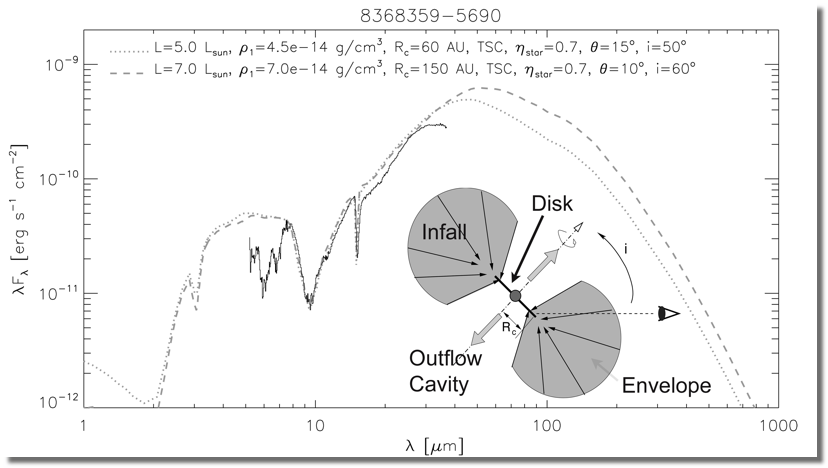Difference between revisions of "StarFormation"
| Line 10: | Line 10: | ||
===Protostars vs Young Stars=== | ===Protostars vs Young Stars=== | ||
| − | Terminology is important. The term protostar has been used liberally. For this project we will use it to refer to the state of star's life in which accretion and infall are still the dominant. The term young star is generally referred to the phase after the accretion and infall processes have stopped, but the star has not yet reached the main sequence. | + | Terminology is important. The term protostar has been used liberally. For this project we will use it to refer to the state of star's life in which accretion and infall are still the dominant. The term young star is generally referred to the phase after the accretion and infall processes have stopped, but the star has not yet reached the main sequence. Age is, of course, relative. Many other, relatively short lived stars, E.g. O, B stars, are also called young stars. |
[[File:model_pars.png | Image courtesy of Elise Furlan]] | [[File:model_pars.png | Image courtesy of Elise Furlan]] | ||
| Line 18: | Line 18: | ||
===Learning Points=== | ===Learning Points=== | ||
| + | * Where do we find protostars? | ||
| + | * Where do we find young stars? | ||
* What are the different triggers by which star formation start? | * What are the different triggers by which star formation start? | ||
* What are the major forces that determine whether a core will collapse? | * What are the major forces that determine whether a core will collapse? | ||
Revision as of 22:45, 31 January 2013
There are a number of good summaries of the star formation process from previous NITARP studies.
Star Formation Links
Protostars vs Young Stars
Terminology is important. The term protostar has been used liberally. For this project we will use it to refer to the state of star's life in which accretion and infall are still the dominant. The term young star is generally referred to the phase after the accretion and infall processes have stopped, but the star has not yet reached the main sequence. Age is, of course, relative. Many other, relatively short lived stars, E.g. O, B stars, are also called young stars.
The protostellar phase is the least understood phase of stellar evolution. In this phase, the fundamental properties of a star, i.e stellar mass, stellar angular momentum and multiplicity are established; these properties determine the future evolutionary trajectory through the pre-main sequence, main sequence and post-main sequence phases. Protoplanetary disks are also created during the protostellar phase; and hence the protostellar phase will ultimately influence the properties of solar systems around stars. Despite the fundamental importance of the protostellar phase, there is currently no generally accepted theory of protostellar evolution. This is due to the unique challenges of studying protostars. Unlike subsequent phases of stellar evolution (except perhaps close binaries in post-main sequence phases), protostars can be influenced by environmental conditions such as the density, temperature and turbulence of the parental gas, collisions with neighboring protostars, and by radiation and winds from neighborhing stars. Furthemore, the protostars undergo rapid evolution in a time frame of only 100,000 years; protostars are consequently rare. Finally, are deeply embedded in molecular clouds and emit most of their luminosity in the far-IR, a regime which cannot be easily studied by ground-based and space-based telescopes.
Learning Points
- Where do we find protostars?
- Where do we find young stars?
- What are the different triggers by which star formation start?
- What are the major forces that determine whether a core will collapse?
- What happens if the core is too small?
- What if the core is too large?
- How long does the proto-stellar phase last?
- What are the major components of a protostar?
